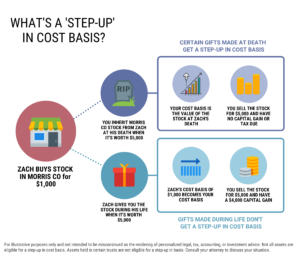Estate planning discussions are seldom had between loved ones. And understandably so; asking your spouse or parents to discuss their mortality isn’t exactly a conversation many of us have over dinner. However, as the baby boomer generation ages, many adult children will find themselves scrambling. Imagine working back on decades of your parents’ financial life to find documents, make arrangements, authorize/pay for care, etc. Balancing your own grief, job, and family life with these sudden and life-changing responsibilities can also have lasting effects, even causing irreparable damage between siblings and grieving families.
3 things adults need to know about their aging parents’ estate plan
- Where are the documents located?
- Who will be the executor of the estate? Are they even aware?
- What’s the plan in the event of incapacity?
Not all issues can be avoided. But there are a number of steps adult children can – and should – take to ensure they are informed about their aging parents’ wishes and some basic provisions of their estate plan. Here are 3 key things you should know about your parents’ estate plan.
1. Where do your parents keep estate planning documents?
It is likely that your parents have some sort of estate plan in place, such as a will or trust, but what good is it if no one knows where it is or who the attorney was that prepared the documents? It is common for one spouse to take on the primary financial responsibilities in the household.
Unfortunately, details regarding family finances, accounts, and estate planning documents aren’t always communicated. As you’re asking these questions, make sure both of your parents are there so everyone is on the same page.
If you’re hesitant to bring up the topic, try and remember, the purpose of asking these questions is not to inquire about a future inheritance. In fact, you’re not even asking to read the documents. You just need to know where they are and how to access them in case you need to.
2. Who is the executor of your parents’ estate?
As part of the estate planning process, your parents will name an executor to their estate. This person is responsible for carrying out their wishes as set forth in their will. Often, parents will name a family member (usually an adult child) as the executor of their estate. This can be problematic for a number of reasons. First, it is a lot of work to be the executor of an estate and sadly, a really thankless job. All of the planning arrangements and financial responsibilities of the estate fall on the executor, who may already be dealing with challenges in their own life.
Also, depending on family dynamics, it can create a rift between siblings and other family members, as inheritance information is revealed. Even if the executor is only following instructions, it’s not uncommon for disagreements to arise. When possible, it may be best to suggest naming an independent third party executor instead. In any case, since the executor is going to be in charge of the estate, it is very important to know who that individual is – especially if it’s you.
What to Do When a Parent Dies and You’re the Executor
Why Put Assets in a Revocable Living Trust?
4 Attorneys Share Real Life Estate Planning Nightmares
3. What happens if your parents become incapacitated?
Another key part of end-of-life planning is what happens when someone becomes incapacitated and cannot participate in their medical care or manage their financial affairs. This can happen from an illness or coma for example, and may be temporary or permanent. A healthcare proxy and durable power of attorney (DPOA) can be completed during the estate planning process to help facilitate ongoing medical and financial arrangements on your behalf.
Adult children should ask where these documents are, and they should also know who has been named. It can be very difficult to get these documents in place after someone is already incapacitated. This can leave family members potentially on the hook for sudden expenses and regular bills to pile up. Further, without a healthcare proxy, doctors may be unable to speak with you about your parents’ condition and you may not have any legal standing to advise about your mom or dad’s specific wishes, assuming you knew what their wishes might be.
Helping your parents get their finances and estate plan organized
Whether your parents are traveling and enjoying their retirement or just slowing down, they may appreciate a hand getting their finances organized. Many aging parents are concerned about being a burden on their loved ones at any point. Still, some hesitate to ask for help even when they need it. Offering to help you may alleviate your parents of some of these concerns.
Checklist for adults named executor for their parents
Key roles:
- Where are the wills located? Are there any instructions you need to access the documents?
- Who is the executor of the estate? What is their contact information?
- What is the name of the attorney or law office that prepared the estate planning documents?
- Who is the power of attorney? Is it durable or springing? Who is in charge of medical vs financial decisions?
- Who are the beneficiaries of retirement accounts and life insurance? Are they current?
Get up to speed:
- Ask for copies of the healthcare proxy and power of attorney documents
- Have your parents set up a trust? If so, is it funded? (Failing to properly title assets in the name of the trust means the assets will bypass the trust and possibly enter probate, which is likely what your parents hoped to avoid by setting up the trust in the first place)
- Ask your parents to make a list of their financial accounts (you don’t need to know amounts if that is a concern) including account number, financial institution, and log in information. Go through it with them, and confirm that their beneficiary designations are still current
- Review account registrations, particularly for bank and individual investment accounts. If an account is only in the name of one spouse, it may be difficult for the surviving spouse to pay bills while the estate is being settled. This can be especially true if the assets are subject to probate. If your parents don’t have a trust, consider learning more about a transfer on death registration which would avoid probate for these types of accounts.
- Make sure that details and policy information are with the estate planning documents for any life insurance policies, pensions, annuities, and social security claims.
- Have your parents list their credit cards, outstanding debts, and any reoccurring payments (like a newspaper) and expenses to the extent possible. The executor will ultimately be responsible for closing these accounts before settling the estate, so the more information they have at their fingertips, the easier it will be
Ask your parents about their wishes:
- Get plans in place, just in case. Estate planning is about more than death – capacity issues are common. Consider adding a durable power of attorney to bank, retirement, or investment accounts before it’s needed for continuity in the event of incapacitation. Discuss whether to add a co-trustee now too. It’s always more difficult than people think to get physician letters to prove incapacity. This is a major challenge when money is needed for medical bills, housing, etc.
- If your parents still live in their home or have valuable or sentimental real property, ask them about it. This may be a difficult conversation depending on your family dynamic. Consider sharing your feelings with your parents if something has an emotional significance for you, or even the opposite. For example, inheriting a home from a parent can be a financial and logistical strain for adult children, leaving them to sometimes feel guilty for selling it later on. Having an upfront conversation about wishes and expectations can hopefully help avoid these dilemmas down the road.
- Ask your parents about their final wishes if/when you feel appropriate. If they don’t know or don’t want to talk about it, that’s ok too. But when the time comes, knowing what your loved one would have wanted will make the arrangements much easier, so you can start the grieving process.
Talk about it – even when you don’t want to
One of the biggest mistakes families make is not talking about uncomfortable topics like death and money. Don’t let your (or your parent’s) unease prevent you from having important conversations. To start, having these discussions during life can save money on taxes and attorney fees. But it can also go a long way in dealing with a parent’s death emotionally (by perhaps not feeling obligated to keep that vacation home or antique collection). And for working adults already grieving the loss of a parent (and potentially trying to support the surviving parent at the same time), it can streamline the administrative burden of settling an estate.
Important disclosure: The material in this article is intended to provide generalized information only and should not be misconstrued as the rendering of personalized legal or tax advice. We strongly recommend you and your parents consult an attorney to discuss your personal situation and estate planning needs.
Last reviewed May 2024










